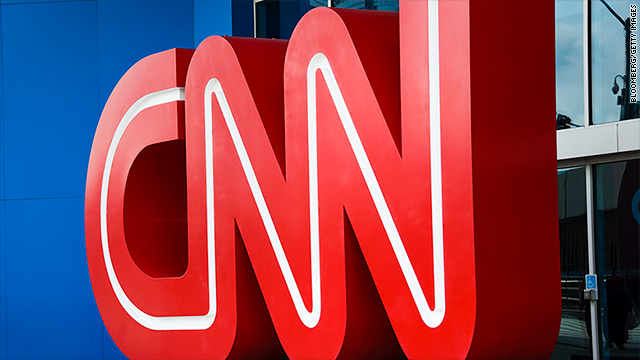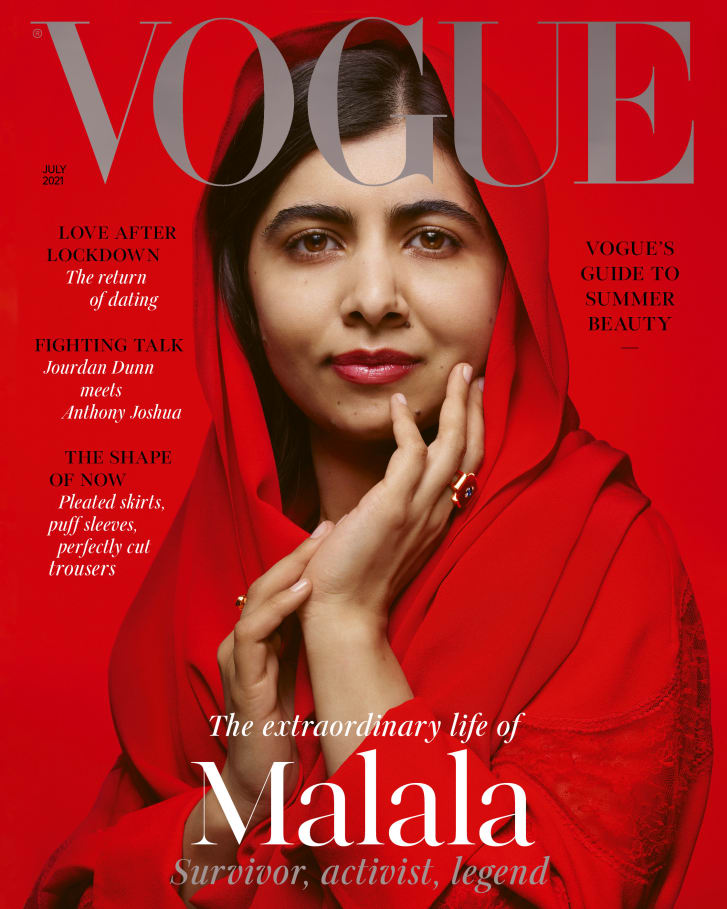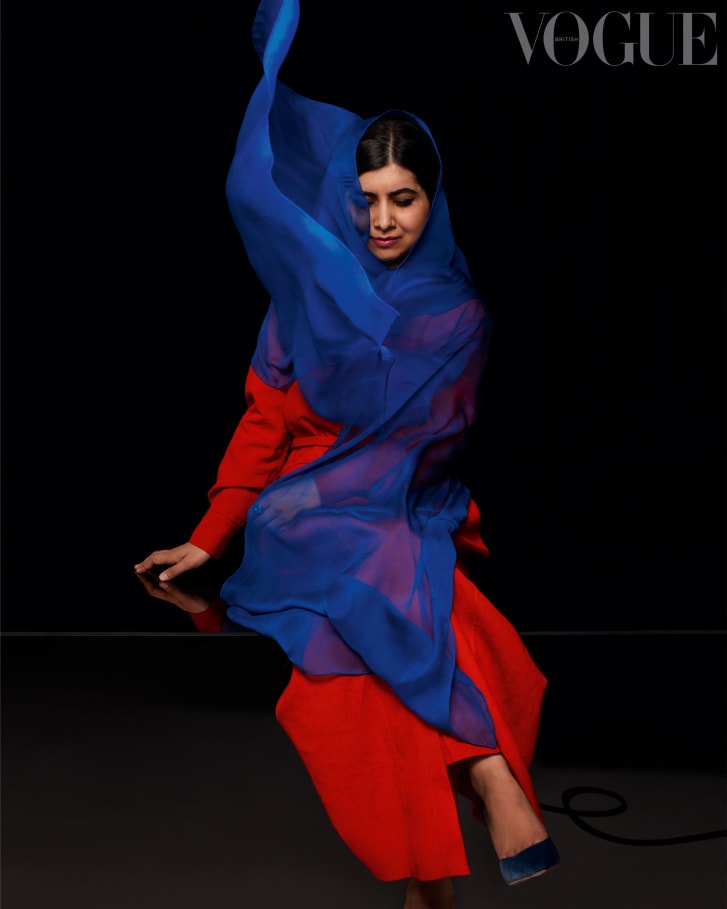M WAQAR..... "A man's ethical behavior should be based effectually on sympathy, education, and social ties; no religious basis is necessary.Man would indeed be in a poor way if he had to be restrained by fear of punishment and hope of reward after death." --Albert Einstein !!! NEWS,ARTICLES,EDITORIALS,MUSIC... Ze chi pe mayeen yum da agha pukhtunistan de.....(Liberal,Progressive,Secular World.)''Secularism is not against religion; it is the message of humanity.'' تل ده وی پثتونستآن
Wednesday, June 2, 2021
'I know the power that a young girl carries in her heart': Malala unveiled as new Vogue cover star
On Instagram, Yousafzai said she was "thrilled and humbled" to be the magazine's newest cover star, adding: "I hope that every girl who sees this cover will know that she can change the world."
Her life now Having long championed human rights and girls' right to education, the Pakistani activist became the subject of global attention when, aged 15, she was shot in the head by the Taliban. She survived after being airlifted to Queen Elizabeth Hospital in Birmingham, UK, and went on to establish her own non-profit organization, the Malala Fund. Last year, Yousafzai graduated from Oxford University with a degree in politics, philosophy and economics, and she recently launched her own production house, Extracurricular. A multi-year deal with AppleTV+ will see the company release documentaries about girls' education and women's rights, as well as comedies, animation and children's series.Elsewhere in the Vogue interview, Yousafzai offered her opinions on the state of activism and politics today. "Right now we have associated activism with tweets," she is quoted as saying. "That needs to change, because Twitter is a completely different world."
She also shared details about her time studying in the UK, saying that she "finally got some time to myself." The activist added that she was "excited about literally everything," from eating at McDonald's to playing poker with friends, although Vogue also described her as "the essay crisis queen," as she recalled leaving essays until the night before they were due. "I was enjoying each and every moment because I had not seen that much before," Yousafzai said. "I had never really been in the company of people my own age because I was recovering from the incident (the Taliban's attempt on her life), and traveling around the world, publishing a book and doing a documentary, and so many things were happening."
https://edition.cnn.com/style/article/malala-yousafzai-vogue-cover/index.html
‘Worse day by day’: journalists speak out after Pakistani vlogger tortured
Gathered before a solemn crowd, Hamid Mir, one of Pakistan’s best-known journalists, spoke defiantly. “Do not ever enter the homes of journalists again,” he said. “We don’t have tanks or guns like you, but we can tell the people of Pakistan about the stories that emerge from inside your homes.”
Mir may have been addressing journalists in Islamabad on Friday, but his words were not directed at them; they were a clear message to Pakistan’s all-powerful military establishment.
Days before, attackers had barged into the home of YouTube journalist Asad Toor, whose videos are critical of the ruling elite. They tied him up and tortured him, but not before allegedly introducing themselves as officers from the Inter-Services Intelligence (ISI), the shadowy security arm of the military.
“I was told that the army and ISI were not happy with my journalism,” says Toor after the attack. “While torturing me, they asked me why I had named ISI and the army in my reporting.”
The Pakistan authorities have denied all involvement and claimed Toor staged the attack in order to seek political asylum abroad. On Tuesday, the Federal Investigation Agency filed a case against Toor for “defamation” of a government institution.
“There is no space for freedom of speech and dissent,” says Toor. “If one criticises the military and Imran Khan, they face physical and online attacks. The level of frustration has rocketed. They can’t tolerate criticism by journalists.”
In response to the attack, Mir was among a group of journalists who had gathered to voice their anger at the increasing violence, intimidation and censorship of journalists who have dared to criticise Khan’s government.
Mir’s speech, which was directed at the military without mentioning it by name, went viral. But on Monday, Mir was told that his popular chatshow, which has been running for two decades, was to be pulled from the news channel Geo TV. The last time this happened to Mir was in 2007, when military leader Pervez Musharraf, then president of Pakistan, declared a state of emergency and suspended the constitution.
Mir is no stranger to intimidation for his reporting: he still has two bullets in his body from an assassination attempt in 2014. But Mir says that press freedom has deteriorated to one of the lowest points he has experienced in his decades-long career.
“They have gone so low,” says Mir, who would not directly name the military or ISI. “They have even shared the contact number of my daughter on WhatsApp and asked others to threaten her. She is just a student. She is now getting threatening and intimidating messages.”
The decision to pull Mir’s show was condemned by many, including Amnesty International, which said it further undermined any protection of free speech “in an already repressive environment”.
“Censorship, harassment and physical violence must not be the price journalists pay to do their jobs,” said Amnesty.
Since Khan came to power in 2018 with the backing of the military, journalists and civil rights groups have spoken out against a steady erosion of press freedom. Violent attacks on journalists are on the rise. In April, a senior Pakistani journalist was shot and wounded in Islamabad, believed to have been targeted because of his reporting.
The military now routinely issues threats to ensure news stories which are negative about the military or Khan’s government are pulled, critical journalists are fired and no coverage is given to opposition politicians and rallies.
According to the International Federation of Journalists, Pakistan is the world’s fifth most dangerous country for journalists. In its 2020 world press freedom index, Reporters Without Borders ranked Pakistan 145th out of 180 countries.
The assault on the media in Pakistan is now about to become law, as the president, Arif Alvi, introduces some of the most draconian censorship seen in years, including an almost blanket ban on negative coverage of the government or the military.
Under these rules, existing press freedom laws will be repealed and a new authority granted power to inspect and raid any news organisation, summon any journalist for investigation and cancel the licence of a media network. Even journalists broadcasting over YouTube would need a licence.
The ordinance also states that TV news anchors cannot broadcast views which are “prejudicial to the ideology of Pakistan or sovereignty, integrity or security of Pakistan” and that no coverage can be given to any story which “defames or brings into ridicule the head of state, or members of the armed forces, or legislative or judicial organs of the state”.
Shahzada Zulfiqar, president of the Pakistan Federal Union of Journalists, describes the new regulation as “media martial law. We are entering into the worst and darkest era of media freedom. In this era there is a lack of safety for journalists both in their career and in their life.
“It is getting worse day by day. Journalists don’t feel safe here.”
https://www.theguardian.com/global-development/2021/jun/02/hamid-mir-journalists-speak-out-after-pakistani-vlogger-asad-toor-tortured
People will no longer be fooled by the PM’s illusion of economic prosperity – says Chairman PPP Bilawal Bhutto Zardari
Chairman Pakistan Peoples Party (PPP) Bilawal Bhutto Zardari has assured the nation that PPP will be taking all the necessary steps required to thwart the conspiracy formed to damage the common man in the upcoming budget economically.
In a statement issued from the Media Cell Bilawal House, the Chairman PPP exposed Prime Minister Imran Khan for hatching a plot with his advisors to target the low-income group in the budget 2021. He also pointed out that inflation in the country has already peaked at 20%, according to the SPI index. If the situation worsens, the impoverished will be unable to survive.
“By imposing heavy taxes in the budget, PTI government wants to burden those who are receiving low salaries,” declared Chairman Bilawal Bhutto Zardari. “Imagine what Pakistan’s condition will be if the salaried group is tied up in taxes?”
Speaking of the COVID healthcare crisis and the downfall of world economies caused by the pandemic, Chairman PPP pointed out that the globe is already suffering. Several economies are on the brink of destruction, and we must ensure Pakistan is not one of them. There will be no greater injustice if our already crippling economy is presented with a budget that does not provide relief to the poverty-stricken public.
“Imran Khan is proving his enmity to the common people by giving amnesty schemes to the rich and collecting taxes from the poor,” remarked Chairman PPP. “How can he sit by and watch thousands of his countrymen die of hunger? Our future generations will be ruined since many families can’t afford to educate them,” he protested.
Addressing the selected prime minister’s claims regarding the nation’s economic growth, Chairman PPP Bilawal Bhutto Zardari commented, “Where is this so-called economic growth? We can’t see it in the statistics! But the doubling rate of unemployment is surely evident.”
He further declared, “The puppet Prime Minister can get appreciation from his ‘fans’ by manipulating the numbers, but the masses will not be fooled by the PM’s illusion of economic prosperity.”
Perplexed at the conniving plan of the current government, Chairman PPP revealed that before presenting the fourth budget, Imran Khan brought his third finance minister and the fifth trade secretary. The economic team of the PM, however, was nowhere to be seen. “A few days before the budget, the PTI government changed the secretary of the finance department and then turned the economic catastrophe into a fake economic growth,” stated Chairman PPP Bilawal Bhutto Zardari, outraged at the audacity of the reigning government.
“Imran Khan Niazi may be influenced by those who want their pockets filled, but I reject PTI’s plot to impose taxes worth billions of rupees in the PTIMF budget. The current inflation rate has caused enough suffering,” asserted Chairman PPP. “We will not sit idly and watch PM Imran Khan present one failed budget after another. Mark my words, his name will go down in the history of his country for the economic crimes. The country will never forgive him,” he concluded.
https://www.ppp.org.pk/pr/24948/





